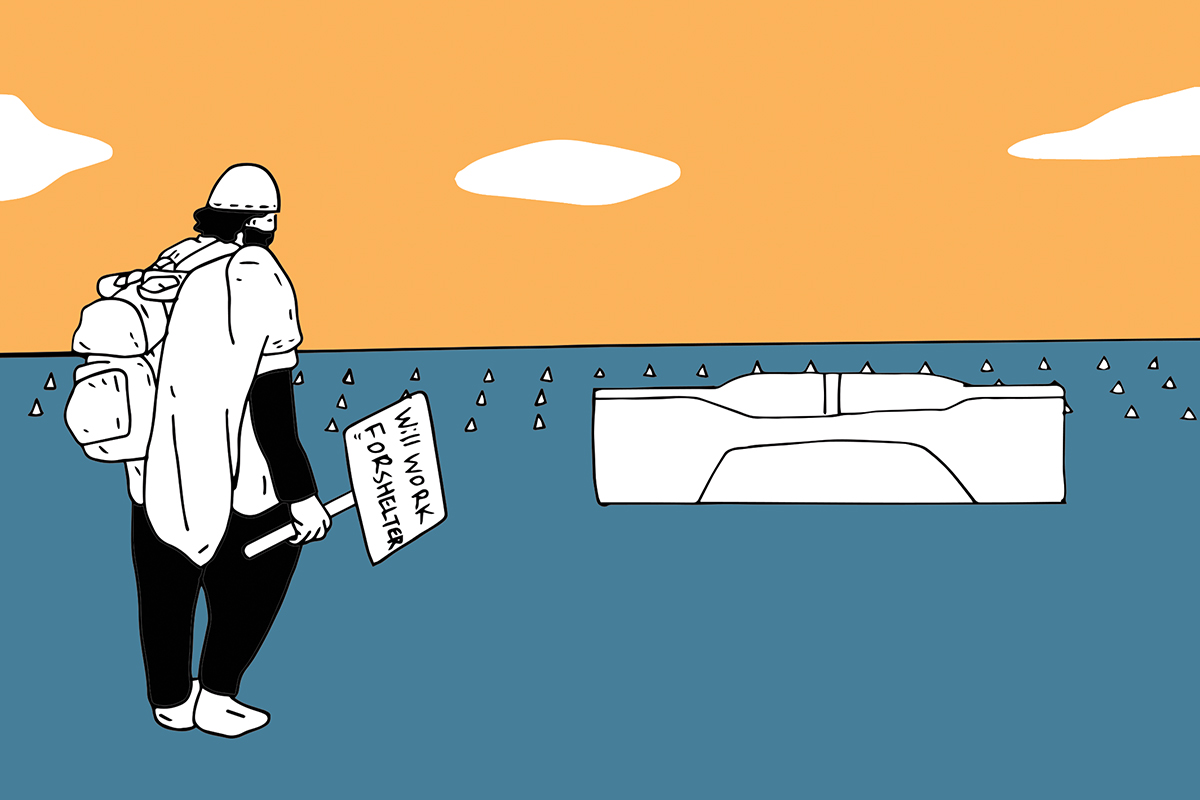Anti-homeless infrastructure isn’t the only thing hurting the homeless—our lack of attention is too
I’m sure you’ve seen the guy who sits in front of the garbage cans at Guy-Concordia metro, with his “Kindness is not a weakness” sign leaning next to him and a perpetually empty Tim Horton’s cup at his feet. He’s there everyday, quietly asking for change or a meal.
Around Remembrance Day, another man appeared in the metro station to collect donations and give out poppies. In a surprising twist, the people who never before had change in their pockets for the man begging everyday were able to produce quarters and loonies for the poppies.
Most people rarely give money to panhandlers and are uncomfortable having homeless people loitering in public places. When fewer homeless people are visible, we don’t ask questions about where they went—we are just relieved the metro station is a little calmer. So it’s not a surprise to me that Montreal has anti-homeless infrastructure, because it teaches us that homelessness is best kept out of sight and out of mind. But problems don’t go away by ignoring them.
Ever wonder why the seats at Laurier metro are floating cubes? Or why all the benches downtown have armrests segmenting the seats? Presumably, it’s to stop people from lying down in these areas, namely homeless people who might not have anywhere else to rest. I believe it’s our city’s way of saying we prefer that they sleep on the ground or don’t sleep in public places.
We need to change the way we think about homeless people in our society. Homelessness is not a lifetime sentence, nor is it a person’s defining feature. We need to see those without a fixed address for who they are: people in need of help.
It can be uncomfortable to talk to some homeless people. They can be dirty, smelly, intoxicated or all of the above. Now imagine how it feels to be the person in that position. Most of us live very comfortable lives, but sometimes we need to leave our comfort zone to solve difficult issues. A great way to help someone in need would be to acknowledge them and give them the 25 cents in your pocket. We can criticize the city for handling the problem poorly, or we can directly support the people suffering from the city’s lack of attention.
In my view, homeless shelters don’t work. They are overcrowded and can be expensive and dirty, creating an environment prone to disease and crime. Researchers at McGill University found that it costs $50,000 a year to care for one mentally ill homeless person, according to CBC News. This is an insane sum, especially considering it doesn’t seem to be reducing the homeless population in Montreal. Global News reported that the Welcome Hall Mission shelter had 2,700 new clients in 2017.
In my opinion, landlords should pay less property tax if they rent to people transitioning from life on the street. Businesses should receive a tax break for employing people recovering from homelessness. This way those stuck in a bad place have more opportunities to pull themselves out of a hole. I believe there are much more effective and sympathetic ways of preventing people from sleeping in public places.
We should all feel guilty when we see someone begging. We are young, compassionate, intelligent people who are in a position powerful enough to protest the inhumane treatment of a group of people. When a homeless person protests being stuck on the street, they are cuffed or removed by security. When we protest the circumstances homeless people are stuck in, we are given media coverage and called activists. It’s strange how we blame those who are in need. This poisonous mindset doesn’t solve the problem, and it needs to be changed.
Graphic by Zeze Le Lin





I don’t know why you think we should feel guilty. In most cases homeless people suffer from defeatism that isn’t caused by you and are beyond your help. “Compassion” in the form of guilt gets nobody anywhere. I see no other reason to feel guilty than to virtue signal